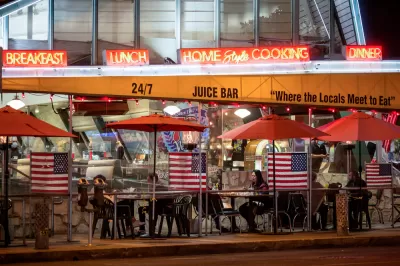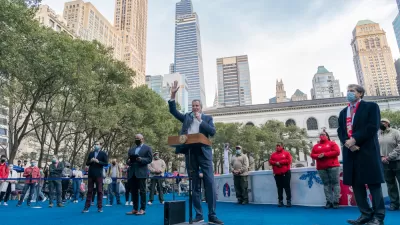The Los Angeles County Board of Supervisors recently closed outdoor dining because of a sudden but rapid rise of coronavirus infections in the county.

After the L.A. County Department of Health's order to shut down outdoor on-site dining facilities, restaurant owners and other food service workers want to know why their service is under fire while retail and gyms are allowed to stay open at a reduced capacity.
What data did the county Board of Supervisors consult when making this decision? Farley Elliott says that Los Angeles County, despite having a "fairly robust" contract-tracing program, has gathered data that are far from exhaustive and clean. The County has faced great difficulty in tracking cases with "10 million inhabitants, 31,000 restaurants, few mechanisms currently in place to limit individual travel, and no mandate to collect customer data at restaurants or points of retail," writes Elliott.
According to county officials, it is estimated that up to 15% of COVID cases can be traced to "dining experience," Elliott reports. UCLA associate professor of community health sciences and epidemiology Shira Shafir indicates that according to the contact tracking data, outdoor dining could contribute to the spread of the virus. Officials point to risk in any activity that requires people to gather, and especially those that require the removal of face coverings.
Elliot says that the county Board of Supervisors' decision to close outdoor dining has nothing to do with the causal data connecting specific activities to the spread of the virus. "Simply put, county officials agreed to shut down outdoor dining because coronavirus cases and hospitalizations have been rising dramatically over several weeks, and reducing the number of places where people gather — especially unmasked — is one of the levers of power available to them," opines Elliot.
FULL STORY: Where Is the Data to Support Closing Outdoor Dining in LA? It’s Complicated

Alabama: Trump Terminates Settlements for Black Communities Harmed By Raw Sewage
Trump deemed the landmark civil rights agreement “illegal DEI and environmental justice policy.”

Study: Maui’s Plan to Convert Vacation Rentals to Long-Term Housing Could Cause Nearly $1 Billion Economic Loss
The plan would reduce visitor accommodation by 25% resulting in 1,900 jobs lost.

Planetizen Federal Action Tracker
A weekly monitor of how Trump’s orders and actions are impacting planners and planning in America.

Grand Rapids Mayor Proposes Garage Conversion Plan
The mayor says allowing homeowners to convert garages to dwelling units could alleviate the city’s housing shortage.

Baltimore Ordered to Improve Sidewalk Accessibility
The city is one of many to face lawsuits for failing to comply with the Americans with Disabilities Act.

This Toronto Suburb Has More Bus Riders Than Columbus, Ohio
Brampton, Ontario used gradual improvements in service to prove that if you build it, they will ride.
Urban Design for Planners 1: Software Tools
This six-course series explores essential urban design concepts using open source software and equips planners with the tools they need to participate fully in the urban design process.
Planning for Universal Design
Learn the tools for implementing Universal Design in planning regulations.
Smith Gee Studio
Alamo Area Metropolitan Planning Organization
City of Santa Clarita
Institute for Housing and Urban Development Studies (IHS)
City of Grandview
Harvard GSD Executive Education
Toledo-Lucas County Plan Commissions
Salt Lake City
NYU Wagner Graduate School of Public Service





























